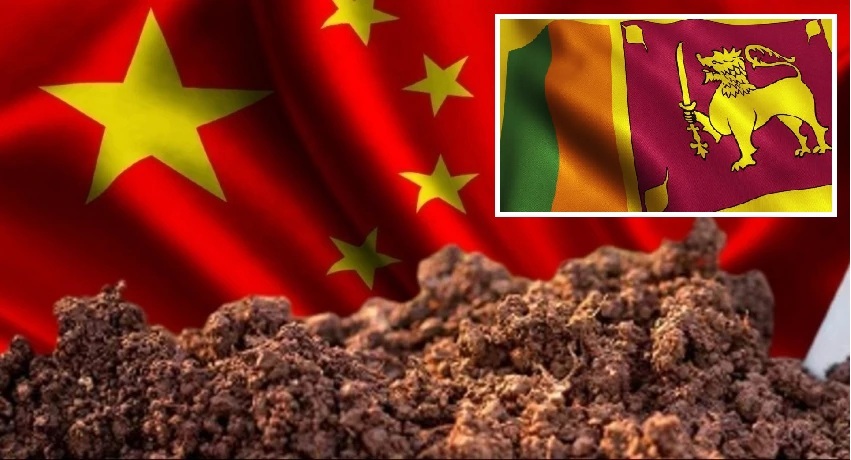
- The Chinese company has launched an international arbitration procedure to settle a growing dispute over the fertiliser export contract to Sri Lanka.
- The contract to be arbitrated in Singapore is worth $49.7 million.
- Seawin Biotech wants the Sri Lankan government to pay 70% of the claim alongside the demand that the Sri Lankan agriculture ministry issue a statement that the shipment was rejected because of an import permit dispute and not because of the quality of the fertiliser.
China debt trap diplomacy has reached all the continents targeting Small, Medium and Island Countries. The Countries with mineral resources, strategic locations, Food Supply, Ideology are the targets of Beijing. To safeguards its nefarious designs China has even dictated and barred few Countries with forced trade embargoes and riots targeting that country establishments in China.
A Great example was targeting Japanese establishments in China, South Korea on THAAD Missiles, and when Australia questioned China on Origin of Covid-19, the latter took it personally and has been trying to contain Australia to this day. When India is trying to improve relations with the US, China is trying to hamper it with forced border tensions, artificial villages and unilaterally changing land air boundaries of not only India but all its neighbours who do not agree with its views.
China’s debt trap, forced drought, forced floods, targeting economic interests were all felt and understood when Tajikistan lost a part of its land, Sri Lanka its port, Uganda its airport and more. Now China’s acts are reaching a new dimension where Sri Lanka barred the Chinese ship carrying organic fertiliser from Seawin Biotech with “harmful bacteria – Erwinia.”
Sri Lanka’s economy is dominated by agriculture. Of its approximately 22 million people, more than 70 percent depend directly or indirectly on agriculture. Any issues in fertilisers or droughts or rains will have effects on the economy so Lanka is very cautious on Agriculture needs.
What Happened
A ship loaded with 20,000 tonnes of fertiliser from Shandong-based producer Seawin Biotech meant for export to Sri Lanka was declined due to “harmful bacteria – Erwinia” in a batch. Dr Ajantha De Silva, director general, Sri Lankan Department of Agriculture, said “Our tests on the samples showed that the (Chinese) fertiliser was not sterile, We have identified bacteria which are harmful to plants like carrots and potatoes, cargo has implications for the bio-security of the country. The People’s Bank of Sri Lanka issued an irrevocable letter of credit to Seawin. The Ship load is on its way back to Singapore.
The Chinese company has launched an international arbitration procedure to settle a growing dispute over the fertiliser export contract to Sri Lanka.The contract to be arbitrated in Singapore is worth $49.7 million. “A notice of arbitration has been issued to Sri Lanka about the international arbitration in Singapore. The Economic and Commercial Office of the Chinese Embassy in Sri Lanka said it attached great importance to this trade dispute given that Sri Lanka’s imports of organic fertilisers this time are a government procurement project and the amount is relatively large. In Sri Lanka the Ministry of Trade, the Ministry of Agriculture and other relevant departments, are strict and have rejected China’s unilateral support to the Chinese Company.
Seawin Biotech wants the Sri Lankan government to pay 70% percent of the claim alongside the demand that the Sri Lankan agriculture ministry issue a statement that the shipment was rejected because of an import permit dispute and not because of the quality of the fertiliser. But none of the conditions have been agreed to by the Sri Lankan government so far. However due to the high handiness of China, Sri Lanka’s Agriculture Minister Mahindananda Aluthgamage has agreed that the government will pay $ 6.7 million and explained his government’s volte face saying “We cannot afford to damage diplomatic relations over this issue”. The Chinese Company Seawin did not want the controversy over the quality of its shipment to Sri Lanka to impact its trade with over 50 countries, including the U.S. Hence it interfered with the Chinese Government and forced it to set things to its advantage. If the cargo is returned to China, it would be a big loss of face for Qingdao Seawin and the Chinese government.
Repercussions for Sri Lanka
Sri Lanka’s plight was witnessed in 2017 when the island’s government was unable to repay the $1.2 billion loan it had taken from China for construction of the Hambantota deep-sea port. It was then forced to hand over the port on a 99-year lease to China Merchants Port Holdings along with 15,000 acres of surrounding land in lieu of repayment of loans.
China is under expansion. It wants other countries’ land, water, minerals and resources. Whatever it produces, whether it is contained or good has to be received. China did not respect international conventions on laws of seas in the Philippines or in the South China Sea but it wants to rein in the world. While China came out victorious in its spat with Sri Lanka over the organic fertiliser controversy, history will judge its actions. Uganda lost its Airport, Lanka its Port, Tajikistan its prime land. Who could be next is the question. For now China has been hunted out of Solomon Islands for its acts. Will the same repeat in Uganda or Sri Lanka or Tajikistan or any other nation which are part of BRI has to be seen.
(The views expressed are author’s own)
M.AM.PhiL/(PhD SNU South Korea)
